The healthiest rice: which variety is best to eat?
Rice is a valuable agricultural plant; it feeds more than half of the world's population. On the shelves of supermarkets and stores, cereals are presented in a wide range of varieties, differing in taste, nutritional and beneficial properties.
What types of rice are there, which rice is the healthiest, what are the beneficial effects on the body, possible contraindications and side effects - this will be discussed in the article.
What types of rice are there?
The genus Rice includes 18 species grouped into 4 sections. The species differ in grain shape. According to this parameter, cereals are classified into short-grain, medium-grain and long-grain. The grains vary in color and taste.
Processing technology determines the chemical composition of the product, dietary and beneficial properties for the body. Many varieties of cereals are not available in the post-Soviet space, so we will focus on several of the most popular and affordable varieties.
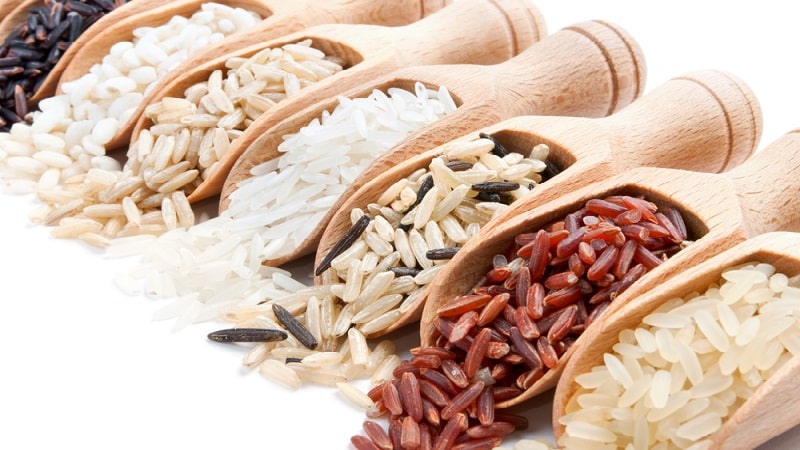
White
The most famous variety is white rice. He ideal for preparing everyday dishes, but in terms of usefulness it has minimal indicators. To give a clean appearance and smooth shape, the grains are subjected to grinding, which removes the husk and bran nutritional shell, which contains most of the compounds beneficial to the human body.
Reference. The main substance in the composition remains starch, so the product has a considerable calorie content (350 kcal per 100 g of raw cereal), a high glycemic index - up to 85 units in dry form, and over 100 in cooked form.
Some manufacturers, in order to increase attractiveness For the final type of cereal, rice is polished using a conglomerate of glucose and talc. This is a carcinogenic compound that increases the risk of cancer and a nervous system disease called Beriberi. This disease is caused by a deficiency of vitamin B1 and is manifested by nausea, paresthesia in the legs, loss of appetite, constipation, and decreased physical and intellectual performance.
Healthier foods include parboiled white rice. Its value for the body is much higher in comparison with traditional white rice, which is achieved due to the grain processing technology used - steaming.
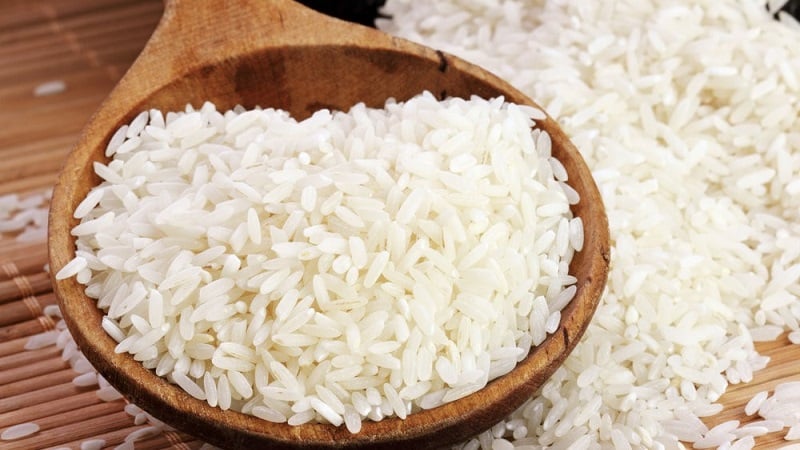
Under the influence of hot steam, almost all useful components pass into the grain itself. The end result is translucent, appetizing-looking rice that cooks quickly, cooks well, and retains its fluffiness.
Brown
The favorite food of healthy eating enthusiasts is brown, or brown, unpolished rice. Due to the preservation of the pityriasis sheath, the variety has a high content nutrients, micro- and macroelements, vitamins. The grains have an unusual dark color and rough structure. Due to the high concentration of fiber, it is rough and has a specific taste.
It takes longer to prepare than its predecessors, The cooking process takes about half an hour, but it preserves all the compounds that are useful and nutritious for the human body.: B vitamins, amino acids, folic acid, zinc, iron, potassium, iodine.
Black
Real black rice does exist. A rare variety - Nerone, grows exclusively in Italy in the valley of the Po River. The black color is characteristic only of the cereal shell and is explained by the high concentration of antioxidants in the composition. The grains under the shell are light. The aroma is reminiscent of the smell of freshly baked bread or hazelnuts.
It differs from other varieties in its high protein content - more than 8 g and fat - 3 g (fat content in dry white rice - 1 g). The cereal is best served as an independent dish or used as one of the ingredients in a salad. The cereal is not cheap, about 210 rubles. for 350 g, so not everyone can afford it as an everyday food.
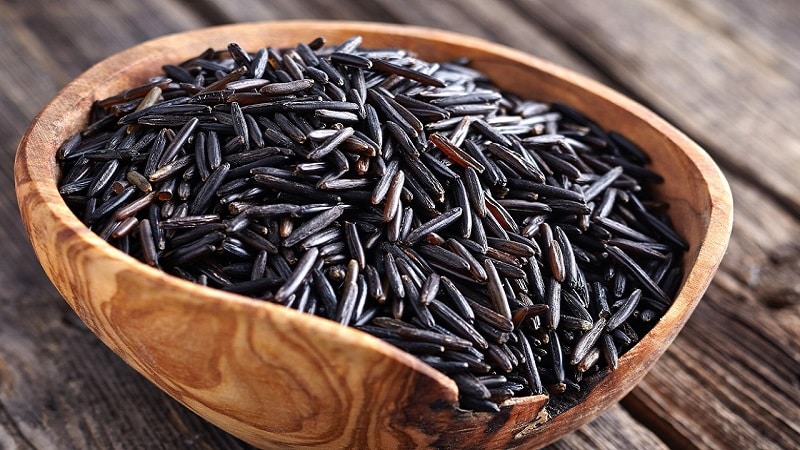
Wild
Wild black, or African, rice - seeds of the herbaceous plant Zizania, rice has no biological relation to the genus. Externally, the cereal resembles small dark needles, has a pleasant aroma and specific taste. Due to its natural hardness, rice must be pre-soaked for several hours, and only then cooked for 30-40 minutes.
Wild rice contains many protein compounds, their share in dry matter reaches 16%, but there are practically no saturated fats and cholesterol. Wild rice surpasses its predecessors in the concentration of folic acid; its content is 5 times higher than in brown rice. But sodium was found to be 2 times less than in ordinary white cereals.
For reference. Harvesting of zizania is carried out on water, which is why this plant is also called “water rice”.In Europe and America, such a product is considered a delicacy; complex assembly technology makes it more expensive than other types of cereals.
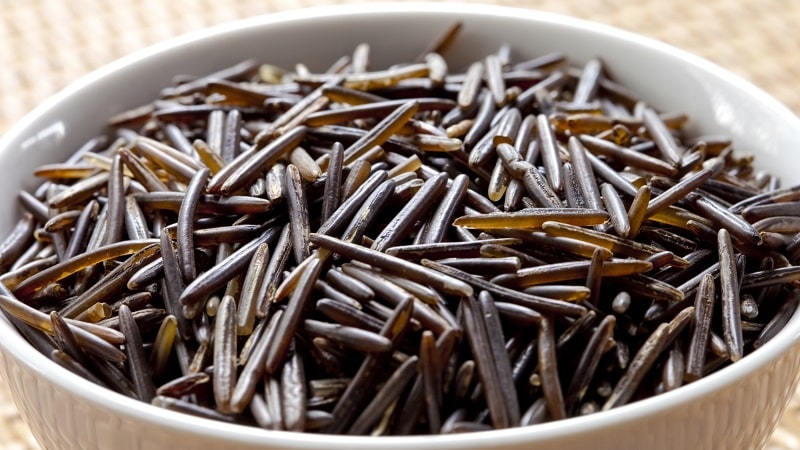
Red
Red rice is good for your regular diet and as a component of therapeutic or dietary nutrition. Until recently, it was impossible to purchase cereals everywhere, but now they have begun to grow them in some regions of Russia, in particular in Kuban.
The grains are not polished, which means they retain their chemical composition, being a natural source of mineral salts, vitamins B, E, H. The remaining bran shell allows you to preserve the shape of the grains during heat treatment and gives them a pleasant hazelnut aroma.
The red color of rice is due to the content of procyanidins.. These are powerful antioxidants (20 times more powerful than vitamin C and 50 times more powerful than vitamin E). Their benefit to the body lies in the ability to reduce the level of harmful cholesterol and prevent the occurrence of cancer of the digestive tract and internal organs. These substances promote weight loss and prevent the development of type 2 diabetes.
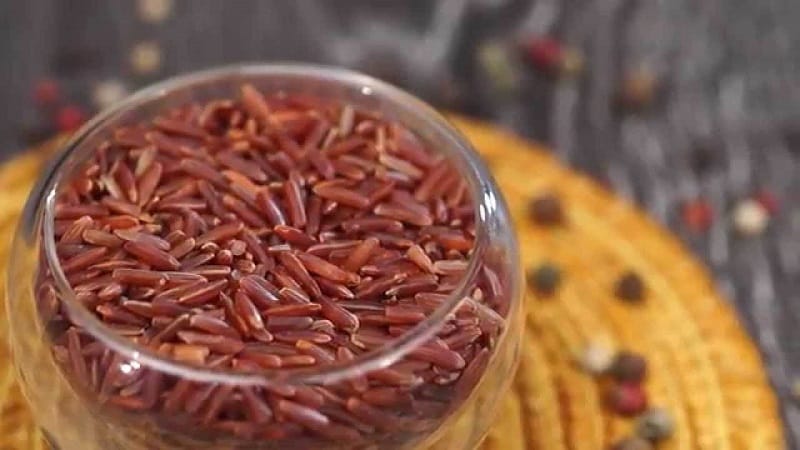
Other
Other healthy varieties of rice - Basmati and Jasmine. Basmati is famous for its delicate aroma, noble taste, and specific grain shape. The cereal contains a large amount of a rare substance - amylase. This is a digestive enzyme that regulates the functions of the pancreas; if it is dysfunctional, it relieves nausea, loss of appetite, and flatulence.
Reference. Basmati is recommended for use as a therapeutic food for pancreatic insufficiency, cystic fibrosis, acute and chronic hepatitis, and toxicosis during pregnancy.
Jasmine - the best rice for Southeast Asians. Valued for its excellent taste, pleasant milky aroma with notes of jasmine. The cereal does not contain gluten or gluten, so it is completely safe for people suffering from celiac enteropathy.
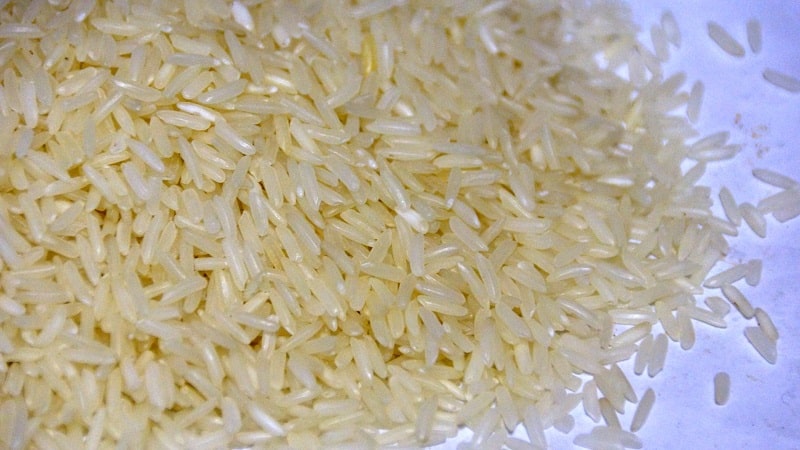
Composition, microelements and calorie content
The best product in terms of availability, pricing and useful properties - brown brown rice, and as an alternative - white parboiled cereal.
Dry brown unpolished rice has calories 367 kcal, 7.5 g protein, 3.2 g fat, 72.7 g carbohydrates. Cooked rice loses 2/3 of its calorie content, and then the serving contains:
- calories - 123 kcal;
- proteins - 2.7 g;
- fats - 1 g;
- carbohydrates - 24 g.
Rice is high in carbohydrates and low in protein and fat compounds. The carbohydrate complex includes starch, dextrins, and sugars. The grains contain up to 70 g of water, pectin fibers, ash, and amino acids. Found in the composition are a complex of vitamins of group B, betaine, vitamins K and E, nicotinic acid, mineral salts (zinc, calcium, potassium, sodium, phosphorus, copper, selenium, manganese, iron).
Benefits of rice for the body
Rice has a wide spectrum of therapeutic activity. With its help, you can improve health in diseases of the heart, blood vessels, liver, kidneys, nervous system, improve the functioning of the digestive tract and metabolism, activate the burning of fat deposits, and improve the health of the body as a whole.
For weight loss
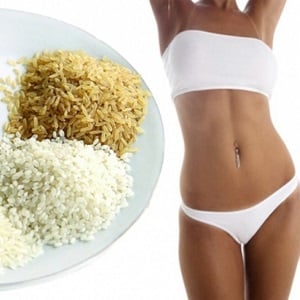 Cooked rice is low in calories, but almost completely retains its inherent beneficial qualities. Boiled rice is nutritious, saturates the body quickly and for a long time with one small portion.Carbohydrates are absorbed by the body within a few hours, filling the body with energy without turning into fat reserves.
Cooked rice is low in calories, but almost completely retains its inherent beneficial qualities. Boiled rice is nutritious, saturates the body quickly and for a long time with one small portion.Carbohydrates are absorbed by the body within a few hours, filling the body with energy without turning into fat reserves.
Cereal contains large amounts of plant fiber, which enhances intestinal motility, activates metabolism, and improves digestion. Its benefits for weight loss lies in the ability to accelerate the process of fat breakdown, increase endurance and performance, which leads to stimulation of physical activity and additional burning of calories.
Rice cleanses the liver, kidneys, blood, removes harmful waste and toxins from the body, excess fluid, due to which swelling subsides.
For cleansing
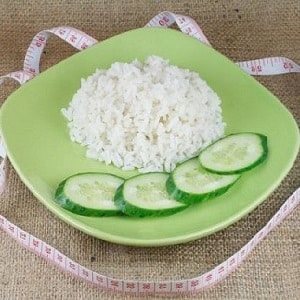 Starch in rice cereal acts like a sorbent: binds toxic substances and removes them from the body, protects the surface of the mucous membrane of the gastrointestinal tract from aggressive mechanical and chemical influences. The cereal cleanses the bile ducts well, provides active cleansing of the liver, dissolves salts, and helps in the treatment of urolithiasis.
Starch in rice cereal acts like a sorbent: binds toxic substances and removes them from the body, protects the surface of the mucous membrane of the gastrointestinal tract from aggressive mechanical and chemical influences. The cereal cleanses the bile ducts well, provides active cleansing of the liver, dissolves salts, and helps in the treatment of urolithiasis.
The obvious advantage of rice is that it removes excess fluid from the body., due to which the swelling goes away. Its diuretic abilities are used to reduce high blood pressure, treat and prevent heart failure and atherosclerosis.
Read also:
Can an allergy to rice occur and how does it manifest itself?
For pregnant
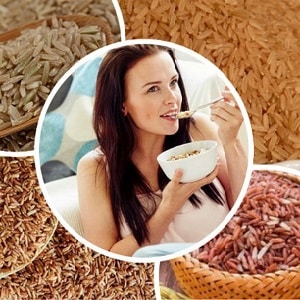 Rice is especially useful for pregnant women due to the presence of folic acid.. This is vitamin B9, without which normal growth and development of organs and tissues of the embryo, including its brain, is impossible. The substance significantly affects appetite, mood, and the state of the nervous system.With a deficiency of folic acid, the risk of placental abruption, miscarriage, and delayed fetal development will increase.
Rice is especially useful for pregnant women due to the presence of folic acid.. This is vitamin B9, without which normal growth and development of organs and tissues of the embryo, including its brain, is impossible. The substance significantly affects appetite, mood, and the state of the nervous system.With a deficiency of folic acid, the risk of placental abruption, miscarriage, and delayed fetal development will increase.
Another reason why pregnant women need rice, - its ability to cleanse the intestines of waste and toxins, remove excess water from tissues, due to which the swelling that bothers almost every pregnant woman goes away.
Rice is a source of healthy and nutritious ingredients, which partly satisfies the body's needs for iron, calcium, potassium, magnesium, phosphorus, zinc, which is important for the normal course of pregnancy, and has a positive effect on the health of the mother and the unborn child.
For reference. Vitamin B9 during breastfeeding is responsible for milk production, prevents postpartum depression, states of apathy, and weakness.
For children
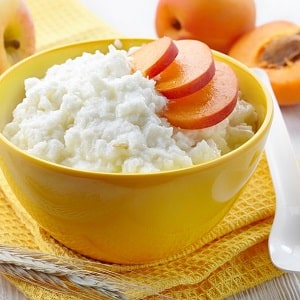 Rice is a natural source of calcium, which creates favorable conditions for the normal growth and development of the child’s body, takes part in the construction of bone tissue and mineralization of teeth.
Rice is a natural source of calcium, which creates favorable conditions for the normal growth and development of the child’s body, takes part in the construction of bone tissue and mineralization of teeth.
No less important for a growing organism is the presence of gamma-aminobutyric acid.. This biogenic substance stimulates brain activity, regulates the production of growth hormone, and improves metabolism in brain tissue. Rice contains many protein compounds that are important for the functioning of the entire cellular system and maintaining muscle tone.
For problems with the gastrointestinal tract
Brown brown rice has a positive effect on the digestive system. Boiled cereal is prescribed as a therapeutic food for gastrointestinal diseases of an ulcerative-erosive nature. It effectively reduces the level of acidity, envelops damaged mucous membranes, protecting against the aggressive action of irritating substances, and accelerates the healing process of ulcerative defects.
Cereal will be useful for diarrhea. Due to the high concentration of starch, it promotes the formation of stool of normal consistency. In addition, it prevents dehydration of the body and fermentation processes in the gastrointestinal tract, reduces the manifestations of flatulence, and relieves the feeling of bloating.
Other
When consumed correctly and regularly, brown rice helps the vascular system reduce cholesterol levels, which serves as a good prevention of atherosclerosis. Cereals help normalize and control blood sugar levels, which helps prevent relapses and complications of diabetes. Cereal has a beneficial effect on the functioning of the heart muscle, increases the elasticity and strength of vascular walls, and reduces their permeability.
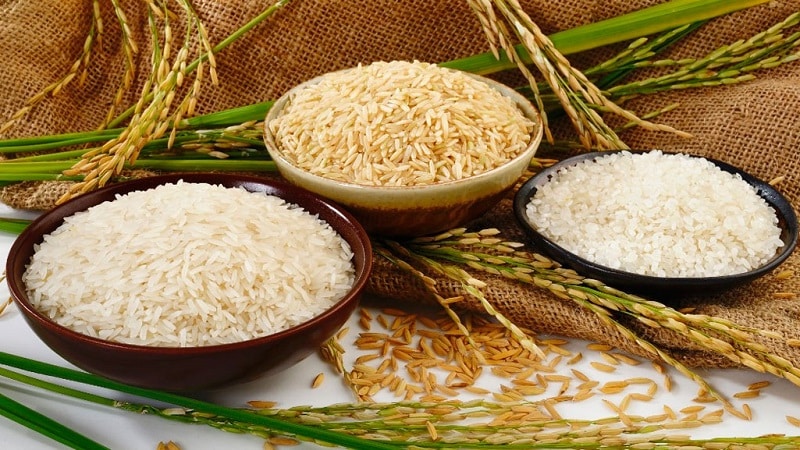
Due to its diuretic effect, rice resists developing hypertension., reduces the risk of heart failure and myocardial infarction. The effect is manifested in removing excess fluid from the body, reducing peripheral vascular resistance, and reducing the load on the heart.
Boiled brown rice will benefit the nervous system. Since cereal includes many B vitamins, micro- and macroelements, eating cereal dishes stimulates cognitive processes, improves memory and concentration, and has a positive effect on brain activity. This variety of rice acts as a sedative, relieves insomnia, reduces the effects of stress, and relieves irritability.
Important. The absorbent qualities of rice porridge make it useful for people with diseases of the musculoskeletal system - osteochondrosis, arthritis, arthrosis, gout.Rice normalizes disturbed metabolic processes, improves blood circulation, and regulates purine metabolism. The amino acids contained in the composition well dissolve deposits of crystals of uric acid salts, which serves to prevent the formation of gouty nodes.
Harm and contraindications to eating rice
Harm to health can be caused if you eat unpeeled varieties of rice with bran shells., the shelf life of which exceeds 12 months. Bran containing rice oil can become rancid and cause food poisoning.
Uncontrolled consumption of large portions of rice increases the risk of constipation. Frequent consumption of cereals adversely affects the concentration of potassium and iron in the body, which can negatively affect the functioning of the cardiovascular system.
In people with individual intolerance When eating rice, there is a high probability of allergies in the form of rashes, peeling of the skin, itching, and swelling.
Before using rice for medicinal purposes, it is necessary to pay attention to the presence of possible contraindicationswhich include:
- hypersensitivity to one or more components of the composition;
- predisposition to constipation;
- formation of large stones in the urinary system;
- diseases of the heart and blood vessels in the acute stage;
- low pressure.
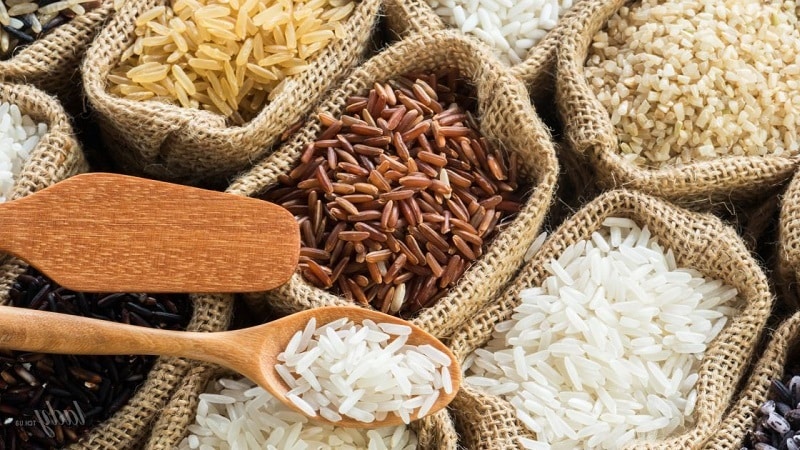
Traditional medicine recipes based on rice
Cereal grains have an absorbent effect and cleanse joints well, remove salts, and help cope with muscle pain. This cleansing is beneficial for various organs and systems.
Recipe for cleaning joints:
- Rinse 3 kg of rice well until clear water, pour in 10 liters of purified water.
- Thoroughly rinse the grains every day for a week (10-15 minutes), then fill with clean water.
- On the last day, drain the water, rinse and dry the grains, and place in a paper bag.
Next, for a month you need to prepare porridge every morning. from 1 tbsp. l. cereals, boiling them for 25 minutes. Nothing is added to the porridge. After breakfast you cannot eat or drink for another 4 hours.
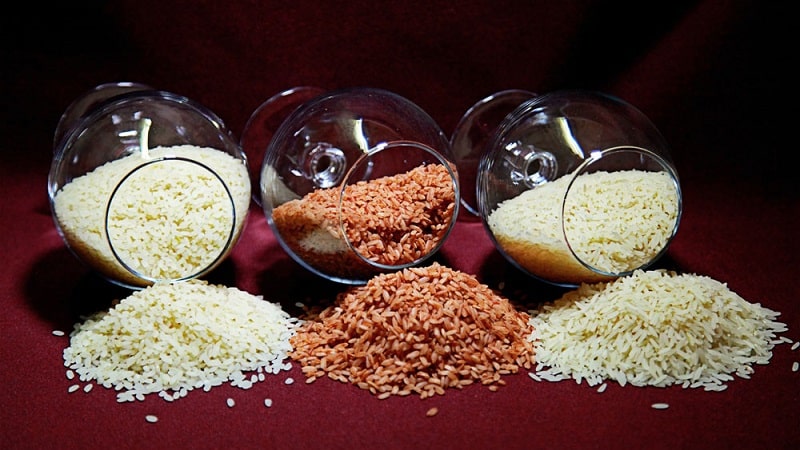
Rice water helps in the fight against upper respiratory tract diseases - sore throat, pneumonia, ARVI, acute respiratory infections. For treatment, use a decoction made from rice, mint, and onions:
- The rice is washed until the water is clear and filled with water in a ratio of 1:7.
- When the water boils, add fresh mint and coarsely chopped onions.
- The broth is cooked covered over low heat for 20-30 minutes.
- Cool, filter through a sieve, and squeeze out the products.
Take 3 times a day 100 ml each.
Conclusion
Taking into account the beneficial properties, taste, availability, and pricing policy, the rice rating is headed by brown (brown) unpolished rice, in second place is white steamed cereal. Both varieties are characterized by a high content of vitamins, micro- and macroelements that are nutritious and valuable for the human body, which are preserved almost completely even after cooking.
Other varieties of rice (black, red, Basmati, Jasmine) also have a beneficial effect on the body, but are more expensive, so not everyone can afford to eat them all the time.